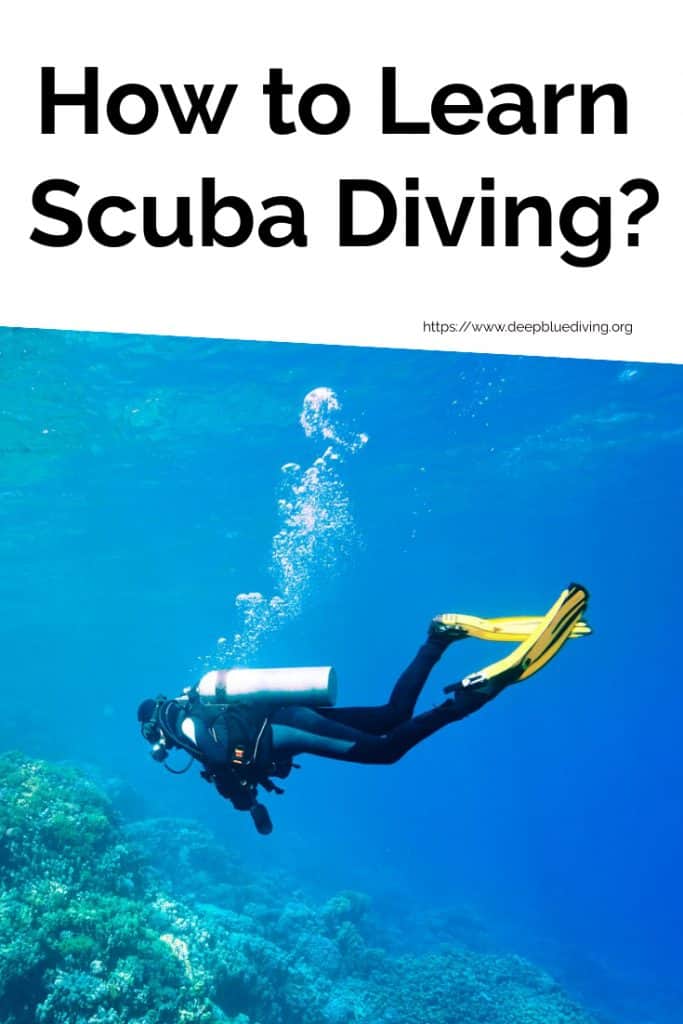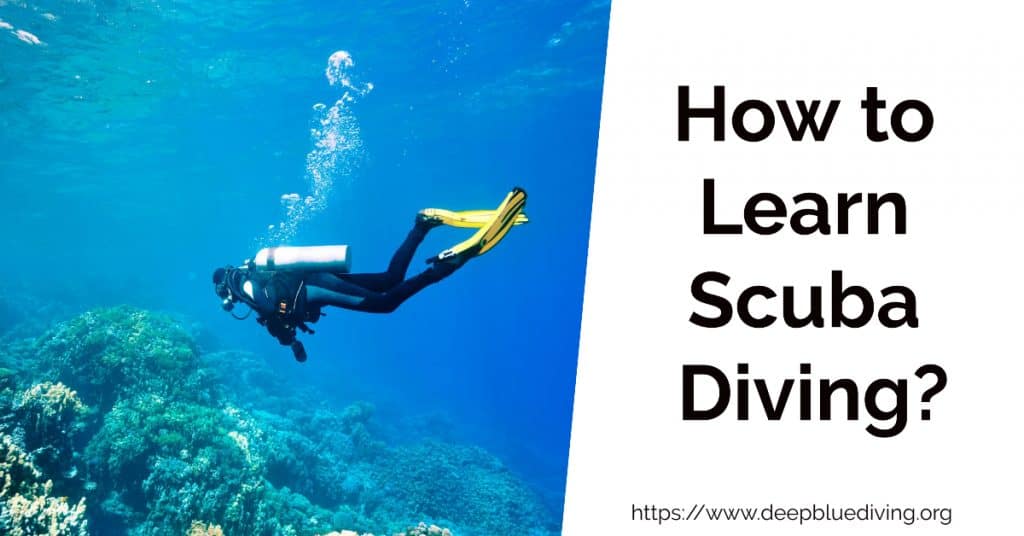How to Learn Scuba Diving – A Beginner’s Guide and Introduction
There is nothing quite like scuba diving. If you want to float weightlessly like an astronaut without going into zero-gravity conditions, then learning to scuba dive is a great way to do that.
Scuba diving is one of the very best ways to explore the breathtakingly beautiful marine universe. Floating beneath the sea with nothing but cerulean waters and the myriad of colorful flora and fauna is an otherworldly and ethereal experience, unlike anything you can see or feel on land.
What is Scuba Diving?
Diving has fascinated humans ever since we found out that there is life beneath the sea. The scuba apparatus was developed by the French underwater explorer Jacques-Yves Cousteau and Emile Gagnan during World War II. After the war ended, scuba diving turned into a recreational sport.
The name “SCUBA” is an acronym of Self-Contained Underwater Breathing Apparatus. As the term suggests, this equipment allows divers to breathe underwater.
The air tank is filled with compressed air — the same air that we breathe outside — and hence contains oxygen, nitrogen, and a mixture of other small gases. Many people erroneously believe the “oxygen” tank contains 100% pure oxygen, but that is toxic to humans — we only require air with 21% of oxygen content to live.
Because compressed air (how much does compressed air weigh?) also contains nitrogen, deep-sea divers need to be very careful when they dive down to deeper depths. That’s due to decompression sickness.
What is Decompression Sickness?
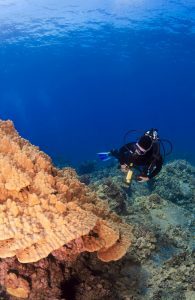
All gases, including nitrogen, increase in pressure as a diver descends into the water. For every 33 feet of descent, the pressure of nitrogen gas increases by 11.6 pounds per inch. Because of the increased pressure, more nitrogen is dissolved in the tissues. The longer the person remains in the deep sea, the more nitrogen is dissolved into the tissues.
However, unlike oxygen, our body has no need for nitrogen, and the gas builds up over time. As the diver comes up, the pressure is lessened and nitrogen bubbles are released rapidly, blocking blood flow and affecting the nervous and musculoskeletal system. This condition is known as decompression sickness or Caisson’s Disease.
The symptoms are wide-ranging and include joint pain, fatigue, breathing issues, pain in the chest, low back pain, numbness of the legs, loss of control of sphincter muscles, swollen lymph nodes, pain in the head and neck, lack of balance, ringing in the ears, and vomiting.
In severe cases, this can also lead to death.
This is why it is very important for diving beginners to remember never to go too deep into the water and never to resurface too quickly.
How Long Does it Take to Learn Scuba Diving?
The length of time it takes to learning scuba diving varies depending on the individual. Usually, it does not take a long time at all.
Getting a scuba certification requires three steps. The academics or self-study part is the first step.
In this step, you need to develop your knowledge about the principles behind scuba diving so that you understand how to dive safely and avoid for example to suffer from the bends. If you are taking a classroom course, they can take several days to several weeks to complete.
However, an online course can help you learn the theory behind scuba diving at your own pace. Depending on how fast you can review and remember all the material, you can finish this step in just hours.
The second part is the confined water dive. In this step, you will learn how to dive in a controlled or confined environment like a swimming pool. This will require you to implement the knowledge that you gained in the academic step. A professional instructor will help you practice different diving skills underwater and teach you how to use the diving equipment.
This session can be finished on a single weekend or in three evening sessions.
The last step is the open water dive session. This involves four or more dives in open water under supervision, in which you will demonstrate all the skills you have learned during the previous steps. The dives can be completed over a two-day period. Once you have successfully finished this, you will be granted your scuba diving certification card.
How Much Does it Cost to Learn to Scuba Dive?
Learning scuba diving may cost a bit in the initial investment. The certificate course can cost you several hundred dollars, depending on which type, of course, you are taking (classroom or online) and the payment for your confined-water training and the open-water dives.
If you add up all these costs, just getting the required scuba diving certification can cost you an average of $350 to $450.
Additionally, you will also be required to buy or rent your own equipment. However, the benefits of learning how to scuba dive will far outweigh this monetary cost.
What scuba dive gear do you need? Check out our complete guide!
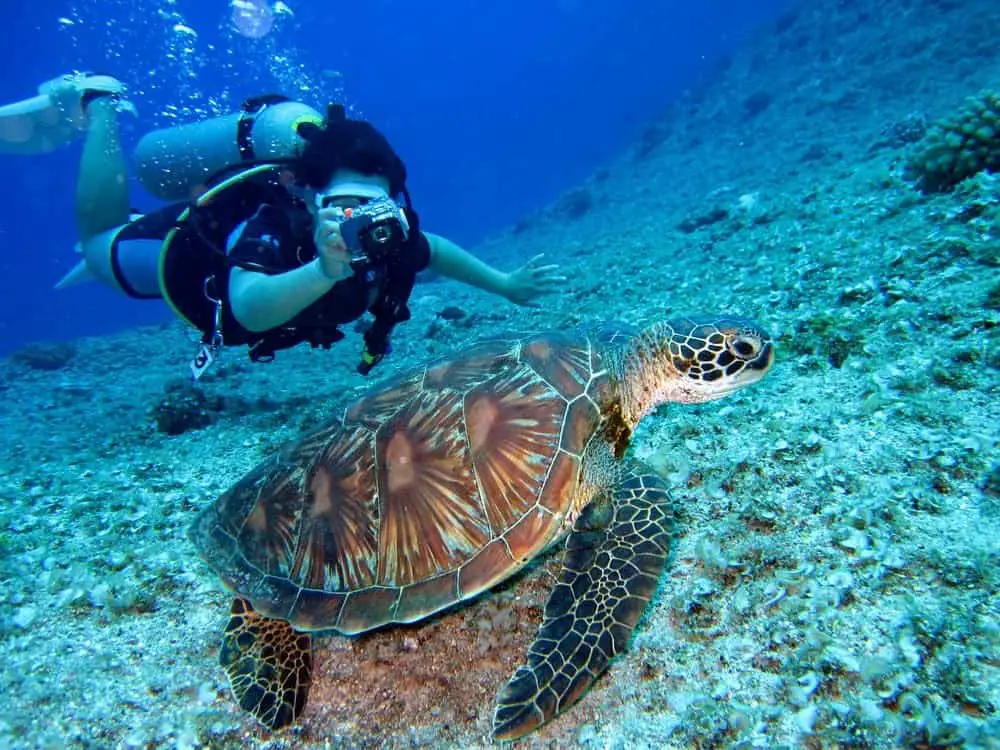
Is It Hard to Learn to Scuba Dive?
As far as recreational activities go, scuba diving is one of the easiest things to learn.
To scuba dive, you need to have a few basic fitness requirements, though they are not at all stringent. You have to be at least 10 years old to dive, in most areas. You may get a junior diver certification if you are less than 14 or 15 years of age, which you can upgrade to an open water dive certification once you reached the minimum age.
Additionally, if you have a medical condition or have a history of one, you need to get a medical release from your doctor.
Aspiring scuba divers also need to be able to tread water or float for 10 minutes as well as be able to swim for 200 yards. You should also have a scuba diving certificate for your own safety. Legally, you could dive without a certificate but it’s dangerous if you do not have a solid understanding of the basics that you get taught in a class!
The scuba equipment may look intimidating but it is very straightforward. The bulk of your gear is formed by the air tank containing the compressed gas, a buoyancy compensator (BC) jacket that can help you control how much deep you want to go, and a regulator to breathe through. Besides that, there is a mask and fins. You will also be required to wear an exposure protection suit to keep you warm in cool waters.
Learning how to scuba dive is just a matter of attitude. You don’t have to be a professional swimming athlete for it. Even if you are not 100 percent confident in your swimming skills, by the time you receive your diving certificate, your relationship with the water will have improved significantly.
Once you decide to take the plunge into the world of scuba diving, you will find it to be a fun and confidence-building experience.
Have a look at the best scuba diving destinations around Savannah and Tybee Island!
Is Diving an Expensive Hobby?
Scuba diving can certainly be a bit of an expensive hobby. The price of the necessary equipment required in scuba diving can exceed the ones requires in other recreational activities like skiing and golfing. The expense is also ongoing because every time you go out to dive, you will need to pay a fee for the divemaster, your air tank, and the boat.
One question that a lot of newbie scuba divers ask is whether to buy or rent out the equipment for scuba diving. If you only plan to dive once or twice a year, it is a good idea to just rent out an air tank. However, if you live near the beach and go scuba diving every chance you get, then investing in the equipment isn’t a bad deal.
Take a look at the breakdown of how much scuba diving can cost you:
Certification: As mentioned above, the certification to get your scuba diving license can cost you around $400. However, since the certificate lasts a lifetime, this is just a one-time investment.
Scuba Diving Equipment: Every scuba diver needs its own set of underwater gear and equipment, including the mask, snorkel, and fins. Although the prices of these items vary from manufacturer to manufacturer, the average cost would be around $150 or $200.
If you want to dive into bigger depths, then you may require some other good-quality equipment as well as a scuba regulator (check out our buying guide for dive regulators), a buoyancy control device, and a dive computer — a device that helps you calculate the time you spend underwater. The total cost of these items can easily be over $1,000, but there are several budget brands that can offer you this equipment in a few hundred dollars. Remember, though, never to compromise on quality, since your life depends on this equipment.
Although this price tag may seem steep to you, remember that these are mostly just one-time investments and you can use all of this equipment for a very long time.
You will also need an air tank the price of which can be anywhere from $475 to $850. However, once the tank is purchased, the air refill will cost you as little as $5 to $20.
Diving: Once you have your license, you will also need to spend more money in renting out a boat or a divemaster. The cost of these varies, depending on the location, demand, and other factors, so find out how much they will cost you.
Scuba Trip: If you live near a beach, you are lucky since you won’t have to spend more money to go to a scuba location. However, if you don’t, you will need to consider the price of the airfare, whether you are going to scuba dive or sightseeing or a combination of these things.
However, this price is applicable to other recreational activities as well, like skiing. Scuba vacations are also available in all budget sizes so you can select the one which you can easily afford. Additionally, there are also liveaboard dive boats that offer you the opportunity of visiting faraway scuba diving resorts and spend as much quality time as you want diving for a discounted all-inclusive price.
All in all, as you can see, taking up scuba diving as a hobby isn’t at all cheap. However, you will find that these costs are worth it once you go underwater and have the chance to experience the marvelous marine life.
Ever thought of diving in Croatia? Check out the best spots!
Do You Need a License to Scuba Dive?
Scuba diving is a “self-regulated” activity, and unlike driving, you do not need a license or certificate to practice it. There are no scuba diving police waiting on the surface to check if you can legally take part in the activity when you come out of the water.
Having said that, diving without a scuba diving certification is very dangerous. There are many risks associated with scuba diving and you need to learn about them comprehensively by taking a scuba diving course.
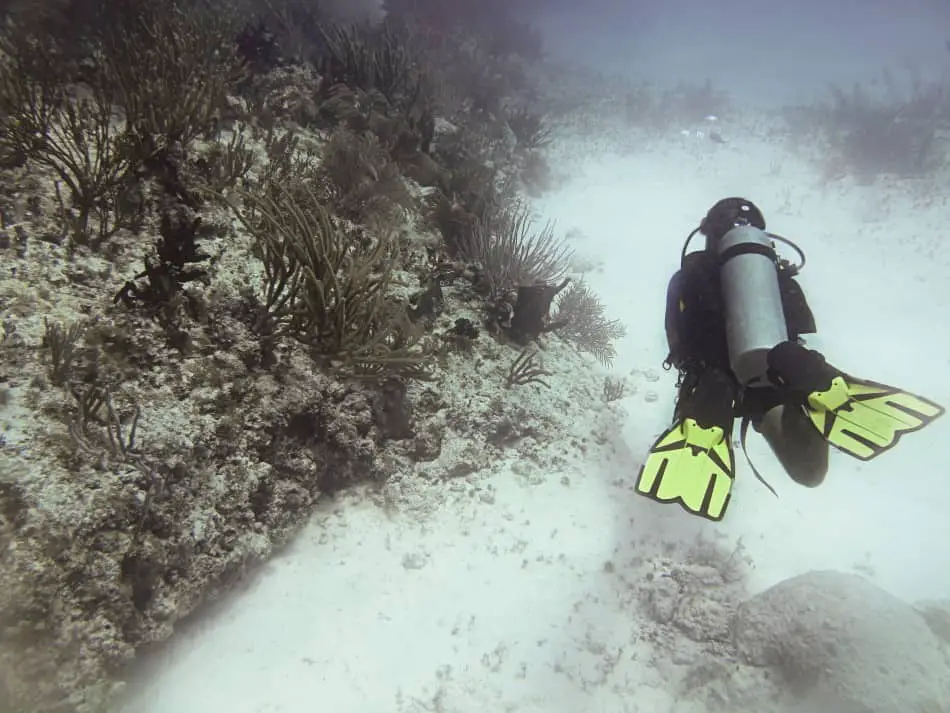
The three most-recognized scuba diving schools around the world include the Professional Association of Diving Instructors (PADI), the Scuba Schools International (SSI), and the British Sub-Aqua Club (BSAC).
Regardless of which school you enroll in, they will all teach you the implications of water pressure as you dive deeper, how to breathe underwater, how dangerous it is to hold your breath, how to safely ascend and descend, and the importance of decompression stops.
As you can see, the main concept behind these courses is safe scuba diving practices.
If you don’t have a scuba diving certificate, you will find it next to impossible to find a dive shop operator who will let you purchase scuba diving equipment without a certificate from a recognized organization.
The same is true for scuba diving operators or dive boat operators, as nobody wants to be responsible for another person’s death. If they do allow you to get into the water, they would be highly unscrupulous and negligent.
For those who do not have certificates, some operators will offer you highly supervised introductory dives in shallow reef waters. Before they allow you to dive, you will be required to go through a basic safety check first. After that, you will only be allowed to follow the supervisor and cannot venture out into the water on your own. To ensure safety, generally a single supervisor is in charge of no more than two divers in shallow waters, with no risk of decompression sickness.
Even though this shouldn’t really be said, there is no actual authority that will stop you from borrowing all the scuba gear you need formal third-party and then going out into the sea alone to scuba dive by yourself. However, remember, that scuba diving, without first knowing about its dangers, is extremely dangerous.
You may dive into the water easily but you may never resurface. Although all of this may sound very dramatic, safety should never be underestimated. It is imperative that you first earn a certificate for scuba diving and only then think of letting yourself loose into the depths of the sea.
Is It Illegal to Dive Alone?
It is not illegal to dive alone the same way it is not illegal to do scuba diving without a certificate. However, once again, diving alone is not at all safe to do so.
One of the things that they will teach you at scuba diving schools is the “buddy system” which will stress the importance of always diving in pairs, as buddies. Diving alone can be very dangerous because we are far removed from the environment in which we ordinarily live and there can be certain unexpected dangers.
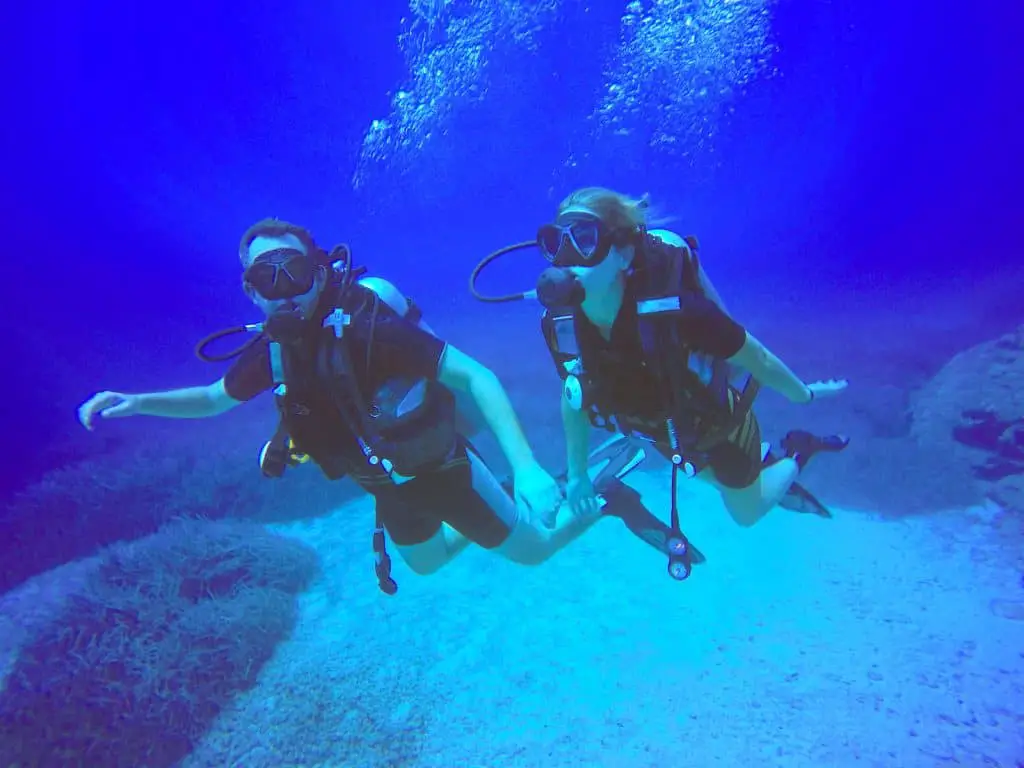
One example of these dangers can be an issue with your aqualung. Your breathing apparatus supplies you with air so that you can breathe underwater. If your air tank ruptures or your equipment fails for some reason, you can rely on your buddy to come to your rescue and share his oxygen supply with you.
But if you are diving alone, you will not have this kind of backup.
Try out a dive at Disney’s Epcot Divequest! Is it worth the trip?
Bottom Line
Scuba diving is not a difficult recreational activity, though it does require caution and knowledge of risk. Any person who is aware of the inherent danger in this sport and how to mitigate them can learn to scuba dive, be they old or young.
However, there are certain medical conditions that may prevent some people from deep-sea diving. Although scuba diving is not a high-intensity sport, it nonetheless puts a strain on your body, particularly since you are doing it in an unusual medium. Additionally, the scuba diving gear for kids and adults can be pretty cumbersome when you are out of water.
Fortunately, though, the gear will become weightless once you are in the water. However, there are other things, like gases being dissolved in your tissues, that you need to be cautious about — which is why you should get medically certified by a doctor to dive.
Although most dive centers do not require a medical certificate from a doctor, you know your condition the best, and if you have even the slightest concern, do not certify yourself as medically safe and get a doctor’s opinion.
Aside from this, there aren’t many things that can prevent you to dive. Most of the time, scuba diving is just a matter of attitude and all you need is some familiarity with the water and some self-confidence to witness and feel a dazzling new world that not many people have experienced.
The Florida Keys offer fantastic dive spots. Check them out!
